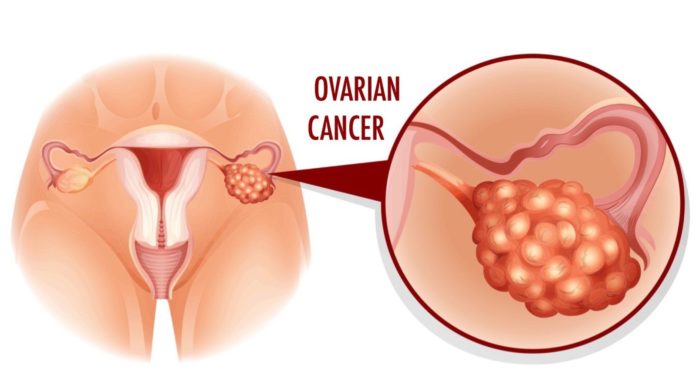
Ovarian Cancer is a disease described by abnormal cell growth. The cancer cells divide, multiply, and form a tumour. If left untreated, cancer can spread uncontrollably anywhere in the body.
Ovarian cancer is also a disease with a high mortality rate. This type of cancer is defined by abnormal cell growth in the tissue that covers the ovaries.
Risk factors for ovarian cancer include:
- Family history of cancers such as breast, ovarian, or uterine cancer
- Never being pregnant
- For women over the age of 50, most cases develop after menopause
- Some fertility and hormone medications
Ovarian cancer is uncontrolled cell growth in the ovaries. For this analysis, it is essential to find it in time.
Symptoms of ovarian cancer
1. Gastrointestinal problems
Generally, women who have ovarian cancer have difficulty digesting food. It can result in high weight loss. Also, affected women may have problems such as diarrhoea or constipation.
Bloating or abdominal pain can be a sign of the menstrual cycle. But unnatural abdominal pain, mainly outside of your period, is a reason for concern.
Talk to your doctor if you’re having bloating or discomfort in your abdominal area.
2. Inflammation
Swelling of the abdomen and bloating is a common symptom of ovarian cancer.
Although this symptom may also be found in other diseases, it should be noted that for ovarian cancer inflammation is common and occurs over long periods.
If swelling of the abdomen is accompanied by weight loss, this may be another sign of ovarian cancer.
3. Urine problems
Frequent urination is also one of the early symptoms of ovarian cancer. However, frequent urination may also be linked to an infection or weakness of pelvic floor muscles.
It may be an itching, uncomfortable pressure, or unpleasant sensation of discomfort during urination.
To decide the cause of this problem, it is best to consult a gynaecologist or your doctor.
4. Painful intercourse
If you endure discomfort or pain during sexual intercourse, it may be a sign of ovarian cancer. In this case, we advise you to go to a doctor to find out the reason for this pain.
5. Abnormal menstrual bleeding
Changes in a woman’s period, such as more massive bleeding than regular or irregular bleeding. Among the main early symptoms of ovarian cancer are menstrual disorders.
This is due to the presence of tumours that can cause hormonal disturbances and injuries in the cervix.
Although these signs can be connected with other diseases, when they are caused by ovarian cancer, the disorder can become severe, with menstruation occurring up to 8-13 times a month.
Because of this, it is essential to pay attention to every symptom or change in the body to detect the condition in time.
Therefore, you should have a medical checkup as soon as possible.
6. Pelvic or abdominal pain
Pelvic, abdominal, or back pains are symptoms that can indicate ovarian cancer, depending on the frequency of occurrence and the fact that the discomfort appears to be manifest for no reason.
The pain may be small, medium, or high. Also, pain can be sharp during sexual intercourse.
7. Vaginal bleeding
There’s a difference between the blood of the uterine wall and vaginal bleeding. Period blood is usually thicker and darker in colour. Vaginal bleeding will have an unusual viscosity and may include pain.
If you’re bleeding when you are not on your menstrual cycle, you need to talk to your doctor as quickly, especially if the blood looks a different colour and texture than your normal menstrual cycle.
Vaginal bleeding is the usual well-known sign of ovarian cancer.
Other symptoms of ovarian cancer can include:
- Constipation
- Loss of energy or appetite, trouble eating, feeling full quickly
- Fatigue (extreme tiredness)
- Back pain
- You urinate more often or are anxious than normal
ovarian cancer diagnosis
A doctor may prescribe imaging tests, such as blood work or ultrasounds, to detect ovarian cancer and to determine the possible cause of the symptoms.
- Physical and Gynecologic Exams
- Imaging Tests for Ovarian Cancer
- Computerized Tomography (CT) Scan
- Transvaginal Ultrasound (TVUS)
- X-ray
- MRI Scan
stage 4 ovarian cancer
Late-stage ovarian cancer, specifically in its fourth stage, has extended its reach to other vital organs, like the liver or lungs. To combat this, the primary courses of action involve a combination of chemotherapy and surgical procedures.
In the realm of cancer diagnosis, the stage serves as a crucial indicator, revealing the extent of its growth and any potential spreading. The various tests and scans conducted to identify cancer offer initial insights into its stage. However, the precise stage might remain uncertain until the patient undergoes surgery, at which point the doctor can provide more accurate information.
Ovarian cancer staging employs a straightforward 1 to 4 scale, known as the FIGO system, named after its creators – the International Federation of Gynaecological Oncologists.
ovarian cancer ribbon

The teal ribbon serves as a symbol to raise awareness about ovarian cancer. This specific color, teal, has been chosen because of the absence of a reliable screening test for ovarian cancer, making it a challenging disease to detect early. Additionally, the symptoms associated with ovarian cancer can be subtle and easily overlooked, underscoring the need for increased awareness.
Note: Women who get these signs almost daily for more than a few weeks should see their doctor.
